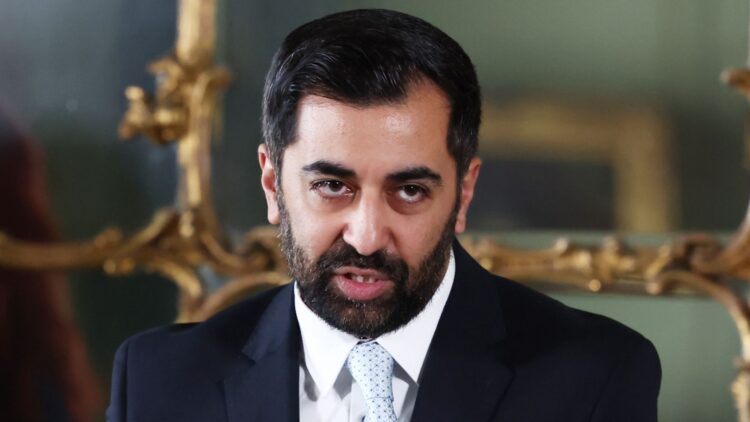By Gabriel Princewill-
Scotland first minister, Hamaz Yousaf (pictured), has quit his post following two challenging no-confidence votes.
In a hurriedly orchestrated speech in Edinburgh, Yousaf admitted he triggered the crisis by unilaterally scrapping a government coalition deal with the Scottish Greens four days ago, leading to the Greens demanding his resignation.
According to a recent poll, majority of Scots wanted him gone before he tendered his official resignation today.
“After spending the weekend reflecting on what is best for my party, for the government and for the country I lead, I’ve concluded that repairing our relationship across the political divide can only be done with someone else at the helm,” he said in a statement at Bute House, the first minister’s official residence.
“Politics can be a brutal business,” Yousaf remarked, his voice wavering with emotion, as he bid farewell to his role as Scotland’s first minister, a position he has held amidst mounting challenges since the departure of Nicola Sturgeon last February.
Only a few days ago, he scrapped a speech at Strathclyde University in Glasgow, where the SNP leader was also due to take part in a question and answer session and be quizzed by the media.
The political fall out was ignited by the SNP’s climbdown on climate targets, and the decision to pause the prescription of puberty blockers for under-18s at Scotland’s only gender clinic.
The ditching of the deal means the SNP will now operate as a minority administration at Holyrood.
The upheaval within the SNP, described by political analyst Professor Sir John Curtice as “God’s gift to the Labour Party,” accentuates the stakes for Sir Keir Starmer’s party, which is striving to regain ground lost during the 2015 wipe out in Scotland.

Yousuf’s resignation is gift to Labour leader Keir Starmer
Labour’s prospects have shown signs of revival, with current polls indicating a potential resurgence, positioning the party to win as many as 22 seats in the upcoming elections later this year.
However, challenges loom large as internal divisions persist, with contenders publicly clashing during the previous leadership contest to replace Nicola Sturgeon.
Yousaf’s decision to step down follows his termination of the power-sharing agreement with the Scottish Greens- a move that triggered swift backlash and set the stage for the impending no-confidence votes.
Despite his initial resolve to weather the storm and secure the confidence of his colleagues, Yousaf ultimately conceded to the mounting pressure, recognizing the need for a fresh start to mend political divides.
Honour
He described it as an “honour” to have served as Scotland’s First Minister.
Just after announcing his resignation, Mr Yousaf said he “could never have dreamt that one day I would have the privilege of leading my country,” noting that as a boy, people of minority ethnicities were not regularly seen in senior governmental roles.
He called Scotland the only country he has ever called home, and at the end of his speech, concluded: “Although of course, I am sad that my time as First Minister is ending, but I am so grateful, I’m so blessed, for having the opportunity afforded to so few to lead my country, and who could ask for a better country to lead than Scotland?”
Among the front runners for the vacated post is John Swinney, who served as Scottish deputy first minister for eight years under Mr Yousaf’s predecessor Nicola Surgeon.
He said he was giving “active consideration” to running for the job, adding: “It’s likely I’ll have more to say on that in the days to come.”
The crisis within Yousaf’s government is compounded by ongoing scrutiny over the SNP’s finances, exemplified by the recent re-arrest of Peter Murrell, husband of former leader Nicola Sturgeon, in connection with a police investigation into the party’s fundraising activities for Scottish independence.
The tumultuous environment, marred by scandal and internal strife, casts a shadow over the SNP’s leadership stability and raises questions about the party’s ability to navigate turbulent waters in the months ahead.
Amidst the chaos, Labour senses an opportunity to capitalize on the disarray within its political rival, as Sir Keir Starmer seeks to capitalize on the shifting tides of Scottish politics to bolster his party’s standing in the nation.

